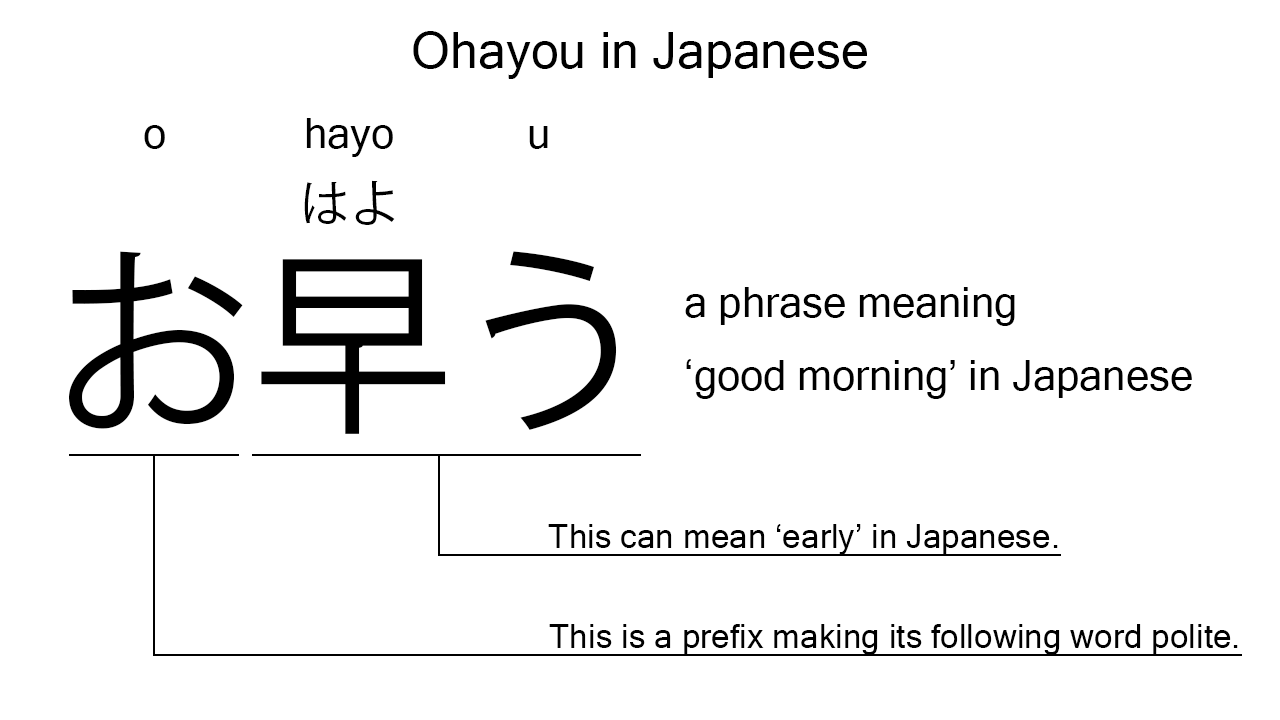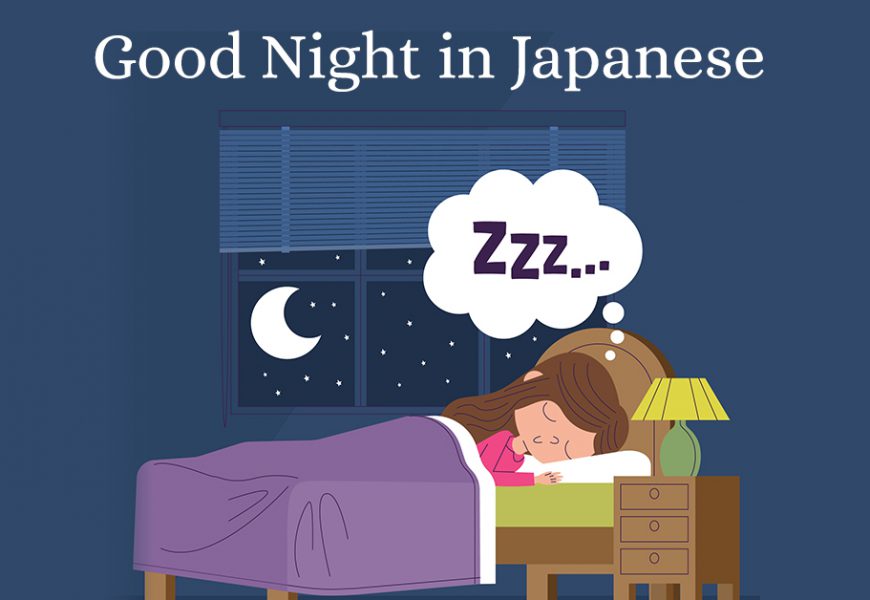Have you ever wondered how to say "good night" in Japanese? Well, buckle up, because we're diving deep into the world of Japanese bedtime greetings, cultural nuances, and everything in between. If you're planning a trip to Japan or just want to impress your Japanese-speaking friends, this article is your ultimate cheat sheet. From the basics to the more advanced phrases, we’ve got you covered. So, let’s get started!
Saying "good night" might seem like a simple task, but in Japan, it’s more than just a phrase—it’s a reflection of respect, politeness, and cultural understanding. Whether you're chatting with a colleague, a friend, or even a stranger, knowing the right way to wish someone a good night’s sleep can make all the difference. Stick around, and we’ll break it down step by step.
By the end of this guide, you’ll not only know how to say "good night" in Japanese but also understand the cultural significance behind it. Plus, we’ll throw in some fun facts and tips to help you sound like a pro. Ready to become a language ninja? Let’s do this!
Read also:Most Expensive Houses On Zillow Your Ultimate Guide To Luxury Real Estate
Why Learning "Good Night" in Japanese Matters
Learning basic greetings in any language is essential, especially when it comes to Japanese. The Japanese language is deeply tied to its culture, and mastering even simple phrases like "good night" can show respect and appreciation for their traditions. Plus, it’s just cool to know how to communicate in another language, right?
Here’s the deal: In Japan, manners are everything. A simple "good night" can convey warmth, politeness, and even strengthen relationships. Whether you're traveling to Japan, working with Japanese colleagues, or just trying to expand your linguistic horizons, this phrase is a must-know.
Let’s face it—Japanese is one of those languages that seems intimidating at first, but once you break it down, it’s actually pretty straightforward. And trust me, saying "good night" is one of the easiest things you’ll learn. So, let’s dive into the nitty-gritty of how to say it correctly.
How to Say "Good Night" in Japanese
The Basics: Oyasuminasai
The most common way to say "good night" in Japanese is oyasuminasai (おやすみなさい). It’s a polite and formal phrase that you can use in almost any situation. Breaking it down, oyasumi (おやすみ) means "rest" or "good night," and nasai (なさい) adds a polite tone. Easy peasy, right?
Now, here’s the fun part: You can adjust the level of formality depending on who you’re speaking to. For example, if you’re talking to a close friend or family member, you can shorten it to just oyasumi (おやすみ). But if you’re addressing someone more senior or in a formal setting, stick with the full oyasuminasai.
Informal vs. Formal
Informal: If you're hanging out with your BFFs or chilling with family, you can use oyasumi (おやすみ). It’s casual, friendly, and perfect for close relationships.
Read also:Why A Lump On Puppy Belly Could Be A Sign Of Something Bigger
Formal: When you’re in a more professional or respectful setting, always go with oyasuminasai (おやすみなさい). This version shows politeness and respect, which is super important in Japanese culture.
Think of it like this: If you're at a dinner party with your boss, you wouldn’t want to sound too laid-back. But if you're crashing on your bestie’s couch, you can totally relax and keep it chill.
The Cultural Context Behind "Good Night" in Japanese
Japanese Etiquette 101
In Japan, etiquette is a big deal. From bowing to greeting strangers, every interaction is steeped in tradition and respect. When it comes to saying "good night," the phrase oyasuminasai is more than just words—it’s a way of showing consideration for others.
For example, if you’re living with roommates or family members, saying oyasuminasai before heading to bed is a polite way of letting them know you’re winding down. It’s like saying, "I’m done for the day, and I hope you have a peaceful night."
Fun fact: In Japan, it’s considered rude to make noise late at night, especially in shared spaces like apartments or dorms. So, saying oyasuminasai is a subtle way of signaling that it’s time to keep things quiet and respect everyone’s rest.
When to Use "Good Night" in Japanese
Knowing when to use oyasuminasai is just as important as knowing how to say it. Here are some common scenarios where this phrase comes in handy:
- At Home: When you’re heading to bed and want to wish your family or roommates a good night.
- At Work: If you’re leaving the office late and want to say good night to your colleagues.
- At a Party: When you’re ready to call it a night and head home, you can use this phrase to bid farewell.
- On the Phone: If you’re ending a call with someone, oyasuminasai is a polite way to wrap things up.
Pro tip: Always consider the context and relationship when using this phrase. The more respectful you sound, the better!
Common Mistakes to Avoid
Don’t Overdo the Formality
One common mistake people make is using overly formal language in casual situations. For instance, if you’re hanging out with your best friend and say oyasuminasai, it might come across as a bit stiff. Stick with oyasumi when you’re in a relaxed setting.
Watch Your Tone
Another thing to keep in mind is your tone of voice. In Japanese culture, how you say something is just as important as what you say. If you’re saying oyasuminasai to a colleague or elder, make sure your tone is polite and respectful. On the flip side, if you’re talking to a close friend, you can be more laid-back and casual.
Don’t Forget the Context
Finally, always consider the situation. Saying oyasuminasai at a loud party or in the middle of a busy day might not make much sense. This phrase is specifically for bedtime or late-night situations, so use it wisely!
Advanced Japanese Phrases for "Good Night"
Other Ways to Say "Good Night"
While oyasuminasai is the most common way to say "good night," there are a few other phrases you can use depending on the situation:
- Yasuminasai (休みなさい): A more casual version of oyasuminasai, often used among friends or family.
- Oyasumi wa daisuki desu (おやすみは大好きです): Translates to "I love sleeping," which is a fun and playful way to express your love for bedtime.
- Oyasumi no jikan desu (おやすみの時間です): Means "It’s time to sleep," which you can use if you’re reminding someone to hit the hay.
These variations are great for adding some personality to your conversations. Just remember to match the level of formality to the situation!
Fun Facts About Japanese Sleep Culture
The Importance of Sleep in Japan
Sleep is a big deal in Japan, and there’s even a saying that goes, "Sleep is the best medicine" (Nemuri wa saisho no kusuri). Japanese people value rest and relaxation, and it’s reflected in their language and culture.
For example, many Japanese people practice something called hito-kuchi miru, which means taking a small sip of water before bed. It’s believed to help with hydration and promote better sleep. Cool, right?
Japanese Bedtime Rituals
In Japan, bedtime isn’t just about crawling under the covers. Many people have specific rituals to help them wind down, such as:
- Taking a hot bath (called furo) to relax and de-stress.
- Drinking herbal tea, like chamomile or green tea, to promote calmness.
- Listening to soothing music or white noise to fall asleep faster.
These rituals are all about creating a peaceful environment for sleep, which is why saying oyasuminasai is so meaningful in Japanese culture.
Practical Tips for Learning Japanese Greetings
Start with the Basics
If you’re new to Japanese, don’t overwhelm yourself by trying to learn everything at once. Start with the basics, like oyasuminasai, and build from there. Practice saying it out loud, and don’t be afraid to make mistakes. That’s how you learn!
Use Language Apps
There are tons of language apps out there that can help you practice Japanese greetings. Duolingo, Memrise, and Lingodeer are great options for beginners. They offer interactive lessons and quizzes to help you master the language in no time.
Find a Language Partner
One of the best ways to improve your Japanese skills is by practicing with a native speaker. You can find language exchange partners online or through local meetups. Not only will you learn the language, but you’ll also get to experience Japanese culture firsthand.
Conclusion: Your Journey to Mastering "Good Night" in Japanese
We’ve covered a lot of ground, from the basics of saying "good night" in Japanese to the cultural nuances behind it. By now, you should feel confident using oyasuminasai in any situation. Whether you’re traveling to Japan, working with Japanese colleagues, or just trying to expand your language skills, this phrase is a must-know.
Remember, learning a new language is all about practice and persistence. Don’t be afraid to make mistakes—it’s all part of the process. And who knows? Maybe one day you’ll be fluent enough to have entire conversations in Japanese!
So, what are you waiting for? Start practicing oyasuminasai today, and let us know how it goes. Drop a comment below, share this article with your friends, or check out our other language guides for even more tips and tricks. Sweet dreams, and oyasuminasai!
Table of Contents
- Why Learning "Good Night" in Japanese Matters
- How to Say "Good Night" in Japanese
- The Cultural Context Behind "Good Night" in Japanese
- Common Mistakes to Avoid
- Advanced Japanese Phrases for "Good Night"
- Fun Facts About Japanese Sleep Culture
- Practical Tips for Learning Japanese Greetings
- Conclusion: Your Journey to Mastering "Good Night" in Japanese


